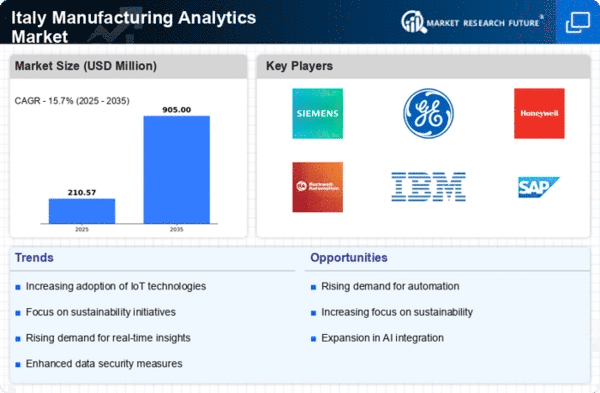Focus on Operational Efficiency
A focus on operational efficiency is driving the evolution of The manufacturing analytics market.. Manufacturers are increasingly seeking ways to streamline processes, reduce waste, and enhance productivity. In 2025, it is estimated that operational efficiency initiatives will account for nearly 20% of total manufacturing expenditures. By leveraging analytics, organizations can identify bottlenecks, optimize resource allocation, and implement continuous improvement strategies. This emphasis on efficiency not only contributes to cost savings but also enhances competitiveness in a rapidly changing market. As Italian manufacturers strive for excellence, the demand for analytics solutions that support operational efficiency is likely to grow, further propelling the manufacturing analytics market.
Integration of IoT Technologies
The integration of Internet of Things (IoT) technologies is a pivotal driver for The manufacturing analytics market.. IoT devices facilitate real-time data collection from machinery and production lines, enabling manufacturers to monitor performance and optimize operations. In 2025, it is estimated that IoT adoption in the manufacturing sector could reach 70%, significantly enhancing data-driven decision-making. This integration allows for predictive maintenance, reducing downtime and operational costs. Furthermore, the ability to analyze vast amounts of data from connected devices empowers manufacturers to identify inefficiencies and improve productivity. As Italian manufacturers increasingly embrace IoT, the demand for advanced analytics solutions is likely to surge, propelling growth in the manufacturing analytics market.
Regulatory Compliance and Standards
Regulatory compliance is a crucial driver influencing The manufacturing analytics market.. The Italian government has implemented stringent regulations aimed at ensuring product quality, safety, and environmental sustainability. Compliance with these regulations necessitates the use of advanced analytics tools to monitor processes and maintain quality standards. In 2025, it is projected that compliance-related expenditures in the manufacturing sector will account for approximately 15% of total operational costs. Consequently, manufacturers are increasingly investing in analytics solutions to streamline compliance processes, reduce risks, and enhance transparency. This trend not only fosters a culture of accountability but also drives the demand for sophisticated analytics capabilities within the manufacturing analytics market.
Investment in Advanced Analytics Tools
Investment in advanced analytics tools is a prominent driver for The manufacturing analytics market.. As competition intensifies, manufacturers are compelled to adopt sophisticated analytics solutions to gain a competitive edge. In 2025, it is projected that spending on analytics tools in the manufacturing sector will increase by approximately 25%, reflecting a growing recognition of their importance. These tools enable manufacturers to analyze historical data, identify trends, and make informed decisions that enhance productivity and profitability. Moreover, the integration of artificial intelligence and machine learning into analytics platforms is expected to further elevate their capabilities, allowing for more accurate predictions and insights. This trend underscores the critical role of advanced analytics in shaping the future of the manufacturing analytics market.
Shift Towards Data-Driven Decision Making
The shift towards data-driven decision making is reshaping the landscape of The manufacturing analytics market.. As organizations recognize the value of data in informing strategic choices, there is a growing emphasis on leveraging analytics to enhance operational efficiency. In 2025, it is anticipated that over 60% of Italian manufacturers will prioritize data analytics as a core component of their decision-making processes. This transition is likely to lead to improved forecasting, resource allocation, and overall performance. By harnessing data insights, manufacturers can respond more effectively to market demands and optimize their supply chains. The increasing reliance on data-driven strategies is expected to significantly boost the adoption of analytics solutions in the manufacturing analytics market.

















